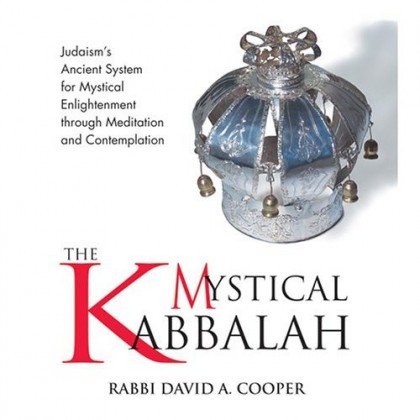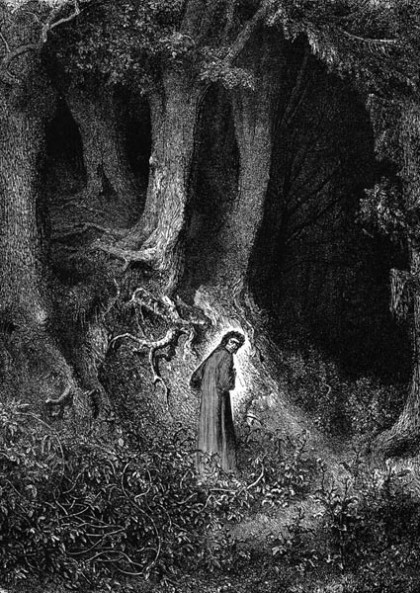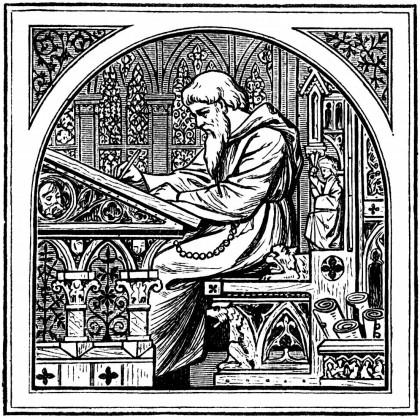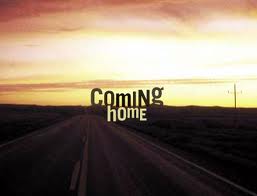Fall Harvest Moon
 The tree of life, the tree of immortality guarded by the angel with the flaming sword; the tree itself still growing in paradise, concealed by language, by our senses, by the everydayness of our lives; the path back to the garden often forgotten, the exile from paradise a separation so profound that we no longer know the location of the trail head and even harder, we no longer have a desire to search for it.
The tree of life, the tree of immortality guarded by the angel with the flaming sword; the tree itself still growing in paradise, concealed by language, by our senses, by the everydayness of our lives; the path back to the garden often forgotten, the exile from paradise a separation so profound that we no longer know the location of the trail head and even harder, we no longer have a desire to search for it.
Metaphor? Of course. But in these three words lie a trap for the unwary, a trap in which I allowed myself to get caught and held, a mindhold trap. My life seems like a sine wave of grasping, then losing the significance of metaphors.
When young, I felt the mystery behind the communion wafers and the grape juice at Alexandria First Methodist. At the tenebrae service, when we extinguished the little candles with their paper drip guards and the sanctuary went dark, I thrilled to the change from ordinary experience, sensed the power rolling over us as the memory of crucifixion and death came hurtling through the centuries to land in our small Indiana town, in the very spot where I sat.
The sunrise services held on Easter morning lit up my whole inside. The power of the tenebrae had been defeated and life did go on forever, death only a mistake, an illusion, misunderstood as a cruelty when in fact it was a gateway. I suppose on those days, repeated over many years, I had a glimpse of the path back to the garden.
My mother’s death, I think, shattered this instinctive faith. Those feelings occasioned by grape juice soaked squares of bread, darkness and the rising of the sun, were a true path and one I lost when the brutal reality of grief smeared the way.
But the memory of that way remained. So I moved up from the instinctive triad of netzach-hod-yesod, forced by fear and loss to skip the next triad chesed-gevurah-tiferet and go to the one easiest for me to access, hochmah-binah-daat. I know these hebrew words may mean nothing at all to you, I’m still at the base of a steep learning curve with them myself, but they do appear on the illustration above so you can see where they are on the tree of life.
In simple, but not simplistic terms, the triads are netzach-hod-yesod, the realm of instinctual behavior, chesed-gevurah-tiferet, the realm of emotions and hochmah-binah-daat, the realm of the intellect. Movement in the tree of life goes from the keter to malchut and back from malchut up to keter, so there is no real top or bottom, only different spots in an ongoing process of creation.
 But here’s the trap. Metaphor, of course! I studied philosophy, religion, anthropology in college. Then, after a few years stuck in unenlightened instinctual behavior-the storied sex, drugs and rock and roll of the sixties and seventies-I moved to seminary. The trap tightened. I learned about the church, scripture old and new, ethics, church history. It was exhilarating, all this knowledge. I soaked it up. I remained though stuck in the intellectual triad, pushing back and forth between the polarity of intuitive wisdom, hochmah, and analytical thought, binah, often not going on to daat, or understanding. I learned, but did not integrate into my soul.
But here’s the trap. Metaphor, of course! I studied philosophy, religion, anthropology in college. Then, after a few years stuck in unenlightened instinctual behavior-the storied sex, drugs and rock and roll of the sixties and seventies-I moved to seminary. The trap tightened. I learned about the church, scripture old and new, ethics, church history. It was exhilarating, all this knowledge. I soaked it up. I remained though stuck in the intellectual triad, pushing back and forth between the polarity of intuitive wisdom, hochmah, and analytical thought, binah, often not going on to daat, or understanding. I learned, but did not integrate into my soul.
There was a time, after seminary, after ordination, as I groped my way around in the work of ministry, that I found the path again. It was in mystical traditions like the Jesus Prayer, or the use of lectio divina, contemplative prayer. I had spiritual directors who guided my prayer life and I meditated often, daily for years, went on private retreats for days at a time. In those years I found my way back to the netzach-hod-yesod triad, traveling again on the instinctual path formed so long ago.
The trap sprung another time, though, as I got better at my ministry, more able to apply organizational development paradigms to congregational life, more able to pull the levers of political power for the good of various purposes: affordable housing, unemployment policy, economic development for poor neighborhoods, fighting off corporate takeovers of those same poor neighborhoods, more able to navigate the internal politics of Presbytery life. I became stuck in malchut, the material world which we experience everyday. So stuck that eventually I could see nothing else and the path disappeared again.
 My heart knew I had gotten lost, in exile once again. In Dante’s words in Canto 1 of the Divine Comedy:
My heart knew I had gotten lost, in exile once again. In Dante’s words in Canto 1 of the Divine Comedy:
“In the middle of the journey of our life, I came to myself, in a dark wood, where the direct way was lost.
It is a hard thing to speak of, how wild, harsh and impenetrable that wood was, so that thinking of it recreates the fear. It is scarcely less bitter than death…
I cannot rightly say how I entered it. I was so full of sleep, at that point where I abandoned the true way.”
This time I knew I had to extricate myself from the subtle trap, get out of the thought world that had me lost in the dark wood, the direct way lost. It was a wild, harsh, seemingly impenetrable forest.
It was clear that for me the Christian faith had gotten muddled up with ambition, immersion in the world of power. And, most problematic of all, it had become part of the metaphor trap. The metaphor had gone stale, had become a barrier instead of a koan. Not the fault of the faith itself, but of my journey within it.
 At the time of its crumbling another path had begun to open for me. Fiction writing emerged when, ironically, I began writing my Doctor of Ministry thesis. Instead of working on it I ended up with 30,000 plus words of what would become my first novel, Even The Gods Must Die. Irony in the title, too, I suppose.
At the time of its crumbling another path had begun to open for me. Fiction writing emerged when, ironically, I began writing my Doctor of Ministry thesis. Instead of working on it I ended up with 30,000 plus words of what would become my first novel, Even The Gods Must Die. Irony in the title, too, I suppose.
In the train of that shift came a decision to look into my Celtic heritage as a source for my fiction. While researching Celtic religion for the fantasy novels I wanted to write, I discovered the Great Wheel.
It grounded me. So to speak. My spiritual life became tactile, bound up in soil amendments, bulbs, corms, seeds, spades and hoes, fruit trees, raspberries and bees. And, of course, dogs. Always dogs.
Meeting Kate enabled me to move gracefully out of the ministry and into a pagan worldview. I was back in the netzach-hod-yesod triad, but now firmly attached to malchut, the queendom of this world.
Writing fiction found me exploring the chesed-gevurah-tiferet triad, having to reach into my heart for believable characters, story lines. Over the course of those years, the years since leaving the Christian ministry and now, I began to gradually integrate the triads, at least the three: intellectual, emotional and instinctual. The combination of family life, the Andover years, writing, and working as a docent at the MIA began to slowly weave them into my soul.
 Even so, I sat behind the barrier, the flaming sword, the metaphor trap. Beth Evergreen and Rabbi Jamie Arnold have started me on a journey back to where I began, immersed in the dark. Seeking for the light, yes, but happy now in the darkness, too. The Winter Solstice long ago became my favorite holiday of the year.
Even so, I sat behind the barrier, the flaming sword, the metaphor trap. Beth Evergreen and Rabbi Jamie Arnold have started me on a journey back to where I began, immersed in the dark. Seeking for the light, yes, but happy now in the darkness, too. The Winter Solstice long ago became my favorite holiday of the year.
When I left Christianity and took up my earth-bound spirit, I shut off access to the fourth triad, the one subsumed under keter: faith-joy/pleasure-will, and its source of energy, the ein sof, the infinite One, perhaps god in small letters. Today, as I write this, I’m more pagan than I’ve ever been, more embracing of the body, the mountains, the stars, the elk and the mountain lion, than any words from any source.
 But. At Beth Evergreen I have begun to feel my way back into the fourth triad, the mystery I first encountered on the hard wooden pews in Alexandria, the one pulsing behind the metaphors of tenebrae, of crucifixion, of resurrection, and now of Torah, of language, of a “religious” life. I knew it once, in the depth of my naive young boy’s soul. Now, I may find it again, rooted in the old man he’s become.
But. At Beth Evergreen I have begun to feel my way back into the fourth triad, the mystery I first encountered on the hard wooden pews in Alexandria, the one pulsing behind the metaphors of tenebrae, of crucifixion, of resurrection, and now of Torah, of language, of a “religious” life. I knew it once, in the depth of my naive young boy’s soul. Now, I may find it again, rooted in the old man he’s become.
